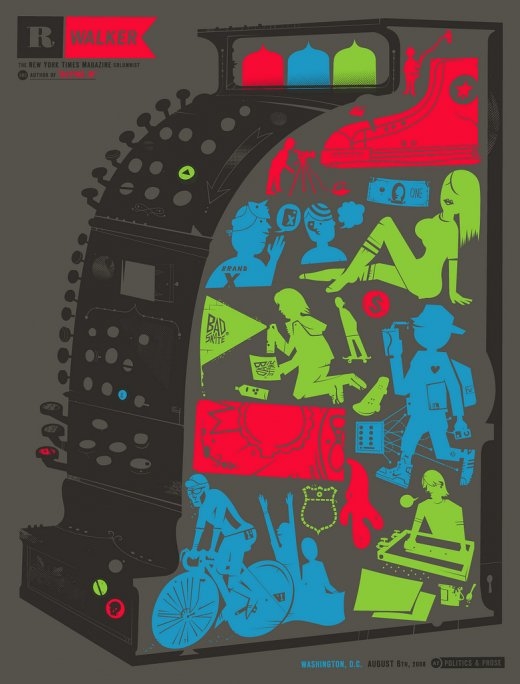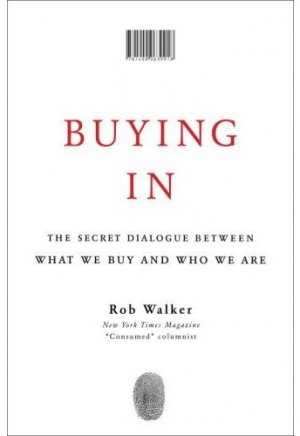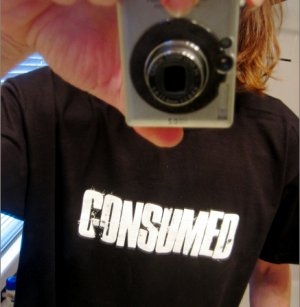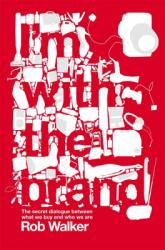
![]() BY ELIZABETH FLYNN Rob Walker wants you to think before you sink your money into another superficial purchase. Walker — who writes the Consumed column for the New York Times Sunday Magazine, and author of Buying In, a highly-readable dissection of the dark art of branding — began his career focusing on advertising and media campaigns in 2000, writing the Moneybox column and other contributions for the online magazine Slate. Through his research into corporate strategies to incite a buying frenzy in consumers, he started asking some questions: If consumers had become, as many studies proclaimed “hyperaware” and “immune” to traditional advertising strategies, why had “the personal savings rate [fallen] into negative territory for the first time since the great depression?”
BY ELIZABETH FLYNN Rob Walker wants you to think before you sink your money into another superficial purchase. Walker — who writes the Consumed column for the New York Times Sunday Magazine, and author of Buying In, a highly-readable dissection of the dark art of branding — began his career focusing on advertising and media campaigns in 2000, writing the Moneybox column and other contributions for the online magazine Slate. Through his research into corporate strategies to incite a buying frenzy in consumers, he started asking some questions: If consumers had become, as many studies proclaimed “hyperaware” and “immune” to traditional advertising strategies, why had “the personal savings rate [fallen] into negative territory for the first time since the great depression?”
___
At the same time corporations were reporting higher earnings than ever before. Walker, noticing this “disconnect between what the experts say and how they behave,” came up with some fundamental questions about the relationship between “who we buy and who we are,” that are at the heart of Buying In. “When marketing experts in particular talked about the birth of the new consumer, what they were really talking about was the reinvention of their own business.” This new consumer hyper awareness, combined with the accelerating progression of new media technologies spawned a new form of advertising — meta by design, stealthy in execution, and viral if all goes well — that is so non-traditional that Walker had to create a new name for it: murketing. In Buying In, Walker describes murketing as “a blend of murky and marketing, murketing has two parts. The first refers to the increasingly sophisticated tactics of marketer who blur the line between branding channels and everyday life.” The second is the “frank complicity” with which the “new consumer” was complicit, sometimes wittingly but often less so, in the marketing and creating of brands. Phawker reached Walker at his home In Savannah, Georgia.
PHAWKER: How has the recent economic collapse affected “murketers” advertising strategies?
ROB WALKER: The new trend in marketing is that it is not as message driven. There’s a change towards the broad trends of using non-traditional marketing against the traditional pitch. Now companies are thinking about placing more emphasis on value. I do notice a different tone in a traditional 30 second ad – but the point of the book has much more to do with subtle changes. The reason that I wrote the book was about consumers who were smart and savvy and immune to savings pitches — trying to say it’s beneficial to have a healthy skepticism about pitches. The message changes with the times.
PHAWKER: In Buying In you talk about the inner conflict of wanting to feel like an individual and simultaneously wanting to feel like one is part of something larger than themselves. It’s an ancient problem, but in Buying In you have it couched in distinctly modern terms.
ROB WALKER: Yeah I agree that it’s both an ancient and contemporary thing. I’m not so much suggesting that humans have changed in some way — but the way that branding has evolved, buying something is really easy to do — much easier than it is to connect with a community in some meaningful way, which takes time and effort. Like belonging to a church, or the army or something, which requires sacrifices. It’s much easier to just buy something. Marketing messages have evolved over time to be about these big ideas rather than functionality — that’s just powerful messaging that’s around us all day long.
 PHAWKER: You also talk about the differences between instrumental materialism and terminal materialism.* Do you think a green approach can be described as instrumental materialism? Like in one of your interviews you talked about how many companies would do disingenuous things like just slap a tree on their label and consider their product green.
PHAWKER: You also talk about the differences between instrumental materialism and terminal materialism.* Do you think a green approach can be described as instrumental materialism? Like in one of your interviews you talked about how many companies would do disingenuous things like just slap a tree on their label and consider their product green.
ROB WALKER: One of the things that I like about DIY is that its largely coming from the bottom — the creators have pretty sincere intent, it’s not just a matter of changing the package design to suggest an ethical dimension that isn’t particularly legitimate. DIY is also not preachy, it’s not exclusive — you can be involved in it as a consumer without having to agree ethically, or be a creator yourself. Recently I found out that “natural” is the most used word on packaging with absolutely no regulations to define what that means. The whole idea that “Main Street has gone green” that was so popular a year ago is being severely tested right now, because the buying paradigm has shifted to the lowest prices no matter what. The fact that Wall Mart’s revenues are way up doesn’t suggest to me that the green idea is holding up really well.
PHAWKER: Is there a tension between DIYism and its sustainability as a successful business model? Kind of like what happened to the Clash, once they got huge, they lost their street cred.
ROB WALKER [pictured, right]: Most of the people that I talked to were very conscious about losing their punk integrity.  I guess it was probably about the generation, but I would hear a lot of people speaking about things like in the early 90’s what bands were going to sign to major labels and which ones weren’t. They are really conscious about it.
I guess it was probably about the generation, but I would hear a lot of people speaking about things like in the early 90’s what bands were going to sign to major labels and which ones weren’t. They are really conscious about it.
PHAWKER: I saw on your website that you’ve done some writing for Adbusters. Much of their focus is devoted to the idea that advertising pollutes the mental environment. There are certain cities, like Sao Palo, Brazil, that have banned outdoor advertising entirely. What about you? Do you feel assaulted by advertising campaigns? Is this a solution that you would advocate?
ROB WALKER: I have a hard time imagining a total advertising campaign ban in US. It’s kind of implausible. With the book I wanted to be more pragmatic. To help readers to try to understand how the advertising machine works and how the human mind works and help people make more informed decisions. But people have complained about advertising for 100 years and there are many more problems out there now that are much bigger, so I’m not sure if that’s a realistic solution.
PHAWKER: Do you feel that your awareness of contemporary marketing and advertising strategies has made you a better consumer?
 ROB WALKER: Definitely. Sort of. Yeah. At this point I consider myself a hyper aware consumer I’m not a simple living fanatic by any stretch, but I do believe in thinking twice and not acting on impulse. I like to try to look in my closet and re-discover what I already own. Either I like it, and I am still pleased, or I think, ‘This really sucks, why did I buy it?’ and try not to make the same decision again. With the column I focus on a new product every week, and at first I think, ‘that’s really cool,’ then by the time that I’m done I’m sort of over it. This sort of reproduces the process of actually consuming something. And that’s what I hope the column for consumers, so that they can vicariously consume rather than run up their credit card balances.
ROB WALKER: Definitely. Sort of. Yeah. At this point I consider myself a hyper aware consumer I’m not a simple living fanatic by any stretch, but I do believe in thinking twice and not acting on impulse. I like to try to look in my closet and re-discover what I already own. Either I like it, and I am still pleased, or I think, ‘This really sucks, why did I buy it?’ and try not to make the same decision again. With the column I focus on a new product every week, and at first I think, ‘that’s really cool,’ then by the time that I’m done I’m sort of over it. This sort of reproduces the process of actually consuming something. And that’s what I hope the column for consumers, so that they can vicariously consume rather than run up their credit card balances.
PHAWKER: I’m going to end with a really typical question, since the crux of your realizations about your own susceptibility to branding was focused around this issue. And I did see that in other interviews you dodged this question, but: What brand of sneaker are you wearing?
ROB WALKER: I try not to endorse things. One brand I will mention is Callous — and they’re out of business, so I can’t really be seen as endorsing them. But I try to buy smaller brands because they have less logos and are better made. The Callous sneaks I’ve had for four years and they still look good, they’re still comfortable, and I haven’t had the need to buy a new pair in that whole time, so I consider that a good purchase.
___
*Instrumental materialism consists of using material objects as symbols to strengthen interpersonal relationships (i.e. photo albums, mementos, etc.) or engage in creative self-actualizing activity such as art or science. On a darker note, terminal materialism occurs when the desire for more possessions runs amok and the habit of consumption becomes an end in itself. Whereas instrumental materialism is seen as a healthy manifestation of a creative engagement with the material world, instrumental materialism is viewed as destructive to both the individual and the natural environment. [source: Association For Consumer Research]
